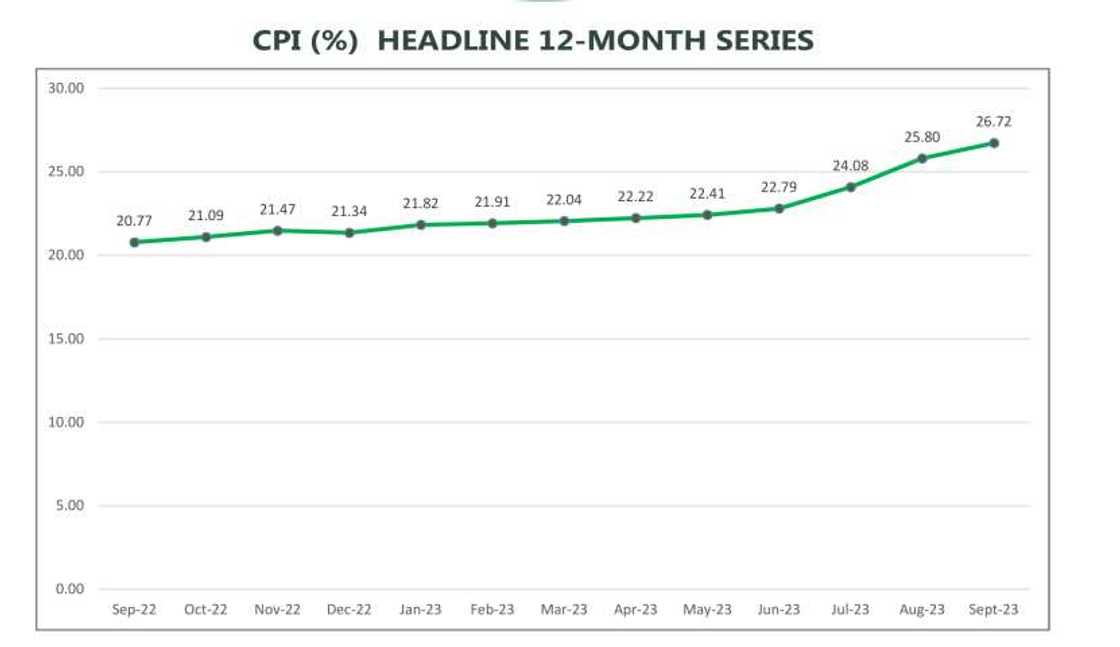Naira Loses More Value As Inflation Soars to 26.72%, Highest Level in 18 Years, Worse in 3 States
- Nigeria's inflation rate reached a new high in September, signifying more Nigerians are poorer and lost their purchasing power
- Data from NBS showed that the 26.72% inflation rate in September is the highest level in 18 years
- Residents in three states witnessed the highest inflation rates in the country
The National Bureau of Statistics has revealed that Nigeria's headline inflation rate, which measures the cost of goods and services over a period, rose to 26.72% in September 2023.
This represents a 5.94% point higher than the inflation rate recorded in September 2022, which was 20.77%.

Source: Facebook
On a month-on-month basis, the headline inflation rate in September 2023 was 2.10%, which was 1.08% lower than the rate recorded in August 2023 (3.18%).
NBS disclosed these figures on Monday, October 16, 2023, in its document titled: "CPI and Inflation Report September 2023."
PAY ATTENTION: Donate to Legit Charity on Patreon. Your support matters!
Details of NBS inflation report
In the document, the bureau also stated that food inflation was 30.64% on a year-on-year basis, which was 7.30% points higher compared to the rate recorded in September 2022 (23.34%).
The rise in food inflation on a year-on-year basis was caused by increased prices of Oil and fat, Bread and cereals, Potatoes, Yam and other Tubers, Fish, Fruit, Meat, Vegetables and Milk, Cheese, and Eggs.
NBS also revealed that on a month-on-month basis, the Food inflation rate in September 2023 was 2.45%, which was 1.41% lower than the rate recorded in August 2023 (3.87%).
States with the highest, lowest inflation rate
Also, NBS revealed the states with the highest and lowest inflation rates and food inflation.
For all-item food inflation, the states with the highest rate are:
- Kogi: 32.95%
- Rivers: 30.63%
- Lagos: 30.04%
The lowest for all items are:
- Borno: 21.05%
- Jigawa: 22.39%
- Benue: 23.22%
For Food inflation, here are the states worst hit
- Kogi: 39.37%
- Rivers: 35.95%
- Lagos: 35.66%
The lowest for food are:
- Jigawa: 23.41%
- Borno: 25.29%
- Sokoto: 25.38%
Expert reacts
Reacting to the latest inflation figure, Muda Yusuf, the director/ceo
Centre For The Promotion Of Private Enterprise told Legit.ng that the Persistent inflationary pressures in the Nigerian economy continue to be a major cause for concern, especially because of the acceleration effect on poverty.
His words:
"Key inflation drivers are not receding, if anything, they have become even more intense. Purchasing power had continued to slump over the past few months.
“These factors include the depreciating exchange rate, surging transportation costs, logistics challenges, forex market illiquidity, astronomical hike in diesel cost, climate change, insecurity in farming communities and structural bottlenecks to production.
“Tackling inflation requires urgent government intervention to address the challenges bedevelling production, productivity and insecurity in the economy. The real sector of the economy needs to be incentivised to ensure moderation of production costs.
“The government could tweak the tariff policies by granting concessionary import duty on intermediate products for industrialists. The same is true of investors in logistics sector. “
Bread supply threatened as rising flour costs fuel conflict between bakers and millers
In a related development. Legit.ng reported how the Premium Bread Makers Association of Nigeria, PBAN, has justified plans to increase bread prices.
The Association of Master Bakers and Caterers of Nigeria, AMBCH, disclosed the planned bread price hike.
Source: Legit.ng





